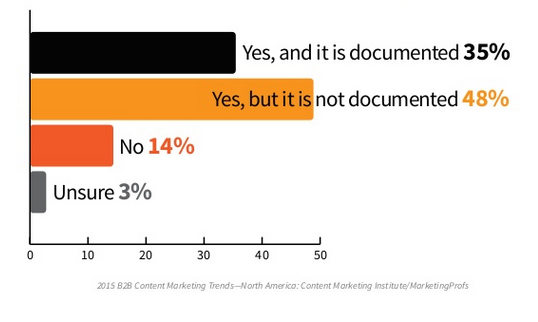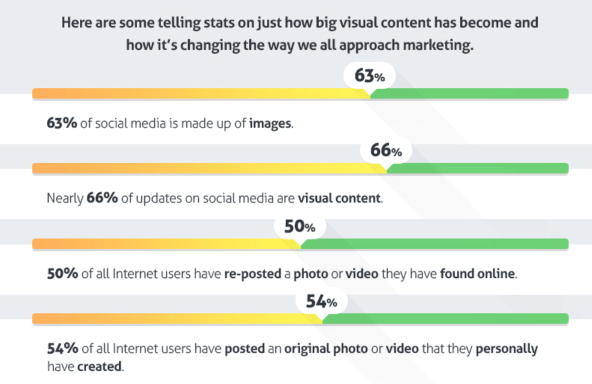So, you’ve finally decided to focus on developing a content marketing strategy that works. Maybe you finally have a dedicated team in place to help you with it, or the company you work for has invested in content marketing resources. Everything seems to be in place, yet you still feel uncertain about your decisions. Before you end up dealing with a content confidence crisis, read through the following.
The Importance of a Well-Defined Content Marketing Strategy
Content marketing is the “king” of demand creation, which is the connection between brand awareness and the all-important lead generation. A well-defined content marketing strategy will build familiarity, appreciation, trust and loyalty with prospective and current clients by providing them with relevant information, in the right format, through the appropriate channels and at the right time.
Based on a recent study by Econsultancy, search engine queries for “Content Strategy” and related search terms have tripled over the past couple of years, supporting the belief that content marketing is now being viewed as its own discipline. This drives home the fact that there’s a genuine need for businesses of all sizes to rethink their conventional marketing plans by adding a well-defined content strategy to the mix, or polishing up an existing strategy that isn’t working.
Nearly three quarters (71%) of businesses, created more content in 2015 compared to 2014, but only 12% feel that they have an optimized content marketing strategy in place. So, given the fact of its importance, why do only 12% of businesses have confidence in their current content strategy? Quality definitely continues to be a challenge with 68% still rating their content marketing as basic or inconsistent (Source: HubSpot and Smart Insights)

Content Strategies Don’t Create Themselves
A successful content strategy is the result of a clear objective, meticulous planning, focused and committed execution. Whether it’s a comprehensive system or one targeted campaign, you need to create a powerful foundation of content that will attract prospects at every phase of the buying process, creating awareness and nurturing an ongoing interest.
So, How Do You Get Started?
First, you need to realize that generating a successful content strategy isn’t a short term matter; you’ll need to make a long term commitment that will require consistent collaboration and engagement for it to succeed. This means you’ll need a content marketing budget and a dependable staff or service that will be committed to the process from content generation to deployment. It’s been proven that marketers that have a well-defined content strategy in place are more effective. When the strategy is written, the chances for success are even greater, which makes sense. If writing a comprehensive strategy seems intimidating, start out by outlining the key components, including your objectives, your brand’s story, the channel’s you plan on utilizing and analytics.
Source: Content Marketing Institute
Know Your Target Audience
To achieve success, you need to know who your audience is, what they want and what they need from you. Before you delve in too far, it’s also important to remember that content marketing isn’t about hard selling. It’s about entertaining, educating and becoming a reliable source of information for your readers in order to earn their confidence and loyalty over time. Blatant self-promotion is one of the biggest turn offs for consumers and one of the top reasons content marketing strategies fail. Instead, tell stories that engage your audience and shift perceptions in compelling, shareable ways.
To identify what topics your content should be covering, start by asking yourself and your sales/marketing team if applicable, the following questions.
- Who are your ideal prospective clients and current clients?
- What questions are they likely to ask?
- What are they interested in? What are their pain and pleasure points?
- What lack of information are they looking for that your content can fill?
- Last, but certainly not least, what prompts them to make a buying decision?
Now, Map Your Buyer’s Journey
By delegating content to the most suitable buying stage, you’ll not only make the best use of pre-existing content, you’ll also be able to uncover any holes that need to be filled.
Don’t be “All Business” All the Time
Whether you’re an entrepreneur, mega business, or a non-profit, your target audience is identical – it’s made up of humans with complex emotions. It might be tempting to fill your content with industry related, techie jargon in an effort to show off your expertise, but this would be a huge mistake. Instead, play to your target audience’s emotions and find ways to eventually reveal how what you have to offer will solve a problem for them. Give some thought to how best to demonstrate your expertise in a way that sparks curiosity, stirs up enthusiasm and even makes them laugh from time to time. It’s called relationship building so have fun with it. If you keep your underlying message in line with their needs, your target audience is going to notice.
Think “Mobile”
When developing your content marketing strategy, it’s important to consider mobile audiences’ preferences and reading habits. Even with all of the buzz over Google’s new mobile friendly search results changes, online marketers are neglecting their mobile audiences and another critical feature – content. When it comes to serving your mobile audience, be sure to use high quality images because studies have shown that mobile consumers check out images more than they do text.
Validation
Without validation, it’s difficult to be confident in a content marketing strategy. Consistently measuring your efforts can generate substantial rewards, which include important insights into your target audience, the most beneficial method for achieving each of your marketing goals. You’ll learn how your audience takes in your content, the kind of content they appreciate, how your content marketing strategy engages your audience, builds awareness and generates business. Armed with this game changing knowledge, you’ll be able to better optimize your content marketing strategy, spend your money more efficiently and last but not least, show proof of the value of content marketing to both supporters and skeptics alike.
Don’t Just Focus on Going Viral
If your main focus is coming up with SEO friendly content and/or going viral, you might end up unintentionally sacrificing your authenticity and forfeit credibility. Instead, focus more on consistent, clever, visual storytelling, and consumers will be motivated to share your content. Just remember, Rome wasn’t built in a day. A good content marketing strategy will eventually establish trusted, long term relationships with future and current clients by consistently delivering relevant, valuable, high quality information. On top of that, it will eventually reinforce your brand positioning and SEO.
By leveraging the information provided here, you can establish an effective content marketing strategy or fine tune the one you currently have in place, gaining confidence in your efforts and drive real results.

